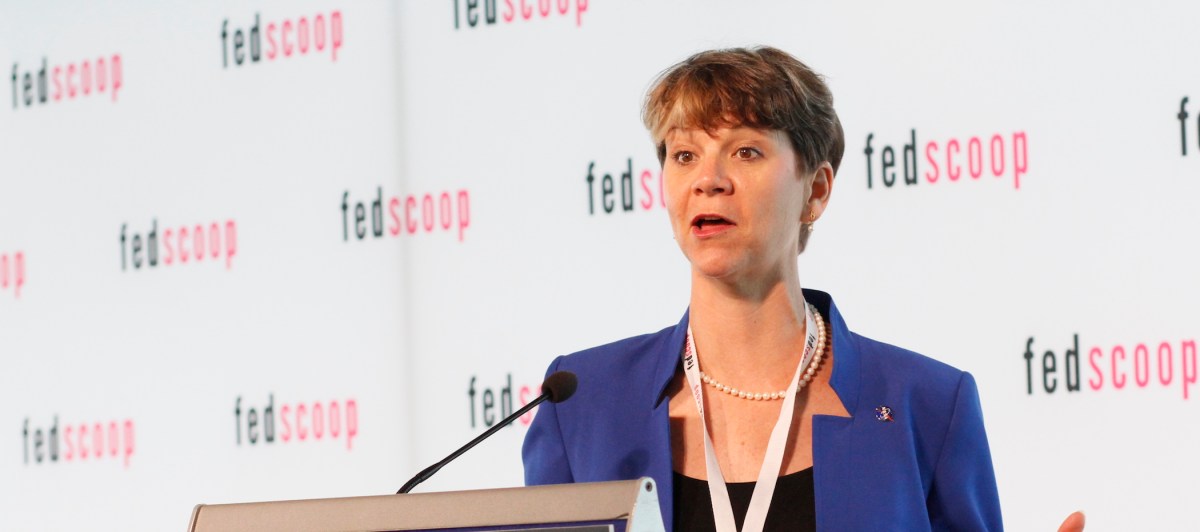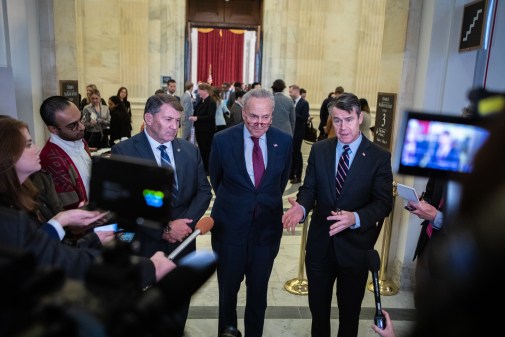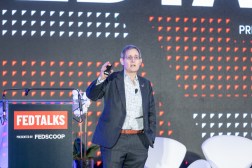Exit interview: Renee Wynn on her journey as NASA CIO and what’s next

Renee Wynn will leave the federal government after 30 years of service at the end of March, she announced last month.
In anticipation of her big move, the longtime NASA CIO spoke with FedScoop recently to recount her tenure as IT chief of the nation’s space agency — some of which didn’t quite go as expected. She also described what her successor will face as she departs, and explained what she’ll miss the most in leaving government.
Wynn didn’t give a specific answer as to what she’ll do next. In addition to getting some rest, she plans to eventually transition to a career in the private sector “to bring what I have learned at NASA to another business, another company and continue to learn wherever I land,” she told FedScoop.
“The space economy is blossoming right now,” Wynn said. “And it’d be interesting to see where that goes. I’d love to be able to have a place at the table to be able to shape a business’ strategy to be thinking about a future whether it’s space or not, but just thinking about their future and what they ought to be doing in delivering value.”
Editor’s note: This transcript has been edited for clarity and length.
FedScoop: You announced you’re retiring from government — what are you feeling, and what accomplishments are you most proud of?
Renee Wynn: I think I’m going to step back and say that I’m very proud of what I’ve been able to do. Although what I thought I was coming to do was very different than how I really spent all of my time, what I’m proud of is the team that I have built and worked with across the entire NASA footprint — all the center CIOs and the folks that are here in my organization, the associate CIOs, and my cyber adviser, and all of the staff here on the second floor of the building that I’m in [in Southwest Washington].
What I’m also particularly proud of is having come into NASA, I just looked at the 150-plus metrics as part of FISMA, and all across the board, NASA was not meeting the basic baseline requirements under the metrics that have been outlined for cybersecurity. And in all the categories, NASA was high-risk when I got here and over my tenure … NASA has gone from high-risk in 2016 to managing risks across the agency, and so I’m really happy that metrics support the statement because the teams with our mission partners have worked really hard to get us there. And it hasn’t been easy, because as you know, we’ve got some legacy IT that’s pretty cool to have around, it’s still a flying asset. That’s not to say we don’t have the legacy IT that we need to do something about. But we do have some unique challenges at NASA.
FS: What do you mean what you’ve done is different than what you thought you were coming to do?
RW: So I was coming in as deputy CIO to help [then-CIO] Larry Sweet build his team and do great things for IT. And by the way, it’s NASA. So the issues that I’ve been dealing with at [the Environmental Protection Agency], I’m sure NASA doesn’t have. So this is gonna be great.
This is the part where the music goes “womp, womp.”
That’s not what I found when I got here. We were in the middle of the first Cyber Sprint led by [Federal CIO] Tony Scott … That’s when I learned that in all of NASA’s rich history, which was to develop and create things, IT, hardware and software that was necessary for our great mission, it wasn’t necessarily designed for an enterprise approach. And some of it is still not an enterprise approach. It was designed a long time ago. And so in some cases that actually couldn’t be enabled with two-factor authentication. And it was at that moment that I realized that how and what I would spend my time at NASA doing is understanding our complex set of systems and where we are. We run a global IT infrastructure, and we have IT not on this planet that touches our global infrastructure. And I would work to learn first, and then seek to better protect NASA’s information assets, our hardware, our software, and foremost, protect our reputation.
And also, I learned that Larry Sweet would be retiring. And that’s when a few weeks after arrival, I was asked to be the CIO. So my plan to help make Larry successful and sit back, to do what I thought would be a fairly straightforward deputy CIO job was blown up in an instant. And it’s been great fun ever since.
FS: How have you thought about where you’re leaving the NASA CIO role and what your successor will need to be successful when you’re gone?
RW: So I like to think I set the next CIO up for success … I see that the individual coming has a couple of challenges. And I see these challenges as really just a great opportunity. The first one is we are in the midst of sorting out IT resources, the people and the dollars that are used for corporate or enterprise IT and finding that and having all of that come under the NASA CIO. Right now, I have a budget for the organization that I have on the second floor of our headquarters building. And the center CIOs have a budget and the missions have budgets that go towards IT. And what we’re in the process of doing right now is assessing all of that, so that the right people and the right dollars now will be reporting to the NASA CIO. We’ll have a lot more authority to decrease redundant capabilities and strengthen areas or add capability from an enterprise perspective moving more away from our former decentralized way of operating to when it’s going to be a blend of enterprise operations, as well as local IT needs.
So that is a huge project. And I am stepping out intentionally right now so that the next CIO has the full ability to shape how that project will be managed, and shape how we implement those decisions … I did not want to get partially through a project like that. And I think I would hurt the next person’s success and I would hurt NASA’s success in implementing this project if I stayed but not all the way to the end.
And the final things for the next person’s success are things that I moved into place in hopes that the next person will just thrive with it, and that is focusing on customer experience. We’ll be bringing in an individual to be responsible for this across our program elements — applications, end-user computing, information management and cybersecurity — to deliver a secure, positive customer experience. So I’m moving with the help of my deputy putting things into place for customer experience so that 2020, the calendar year, will be that year of focus, building upon our cyber posture, and looking towards a very bright future of NASA being able to organize itself as a futuristic, future-leaning CIO organization.
FS: How did the Federal CIO Council support the work you did as a federal CIO?
RW: I think I am fortunate to have served on the Federal CIO Council, either as an acting CIO or NASA’s CIO, since 2013. So I’ve seen the Federal CIO Council really evolve into an amazing collaborative group of folks who desire to serve the United States public through excellent IT practices. The folks that have come in under Suzette Kent‘s tenure from the private sector have really taught those of us who were here a lot because they came from private sector businesses and did CIO jobs, and they have embraced what they’ve seen here. Sometimes new people come in and they say, “I’m just going to change it.” And I’ve seen many of them navigate a rich history of the federal government and bring in new ideas and I hold them in the highest esteem for being able to do that because, in the private sector, I hear it’s a little different than it is in the federal sector.
Suzette has done a really good job helping us work across and hold our team together as a unified council in our operation. … The council has worked together. It is that council that has given me the ideas and the playbook to come back and bring that to NASA. And, so I would say, building off a history of previous federal CIOs and garnering the camaraderie and the smarts of the CIO Council has continued to set federal agency CIOs up for success. It has been much easier to get the talent from our colleagues and to learn from them.
FS: What are you going to miss the most leaving government?
RW: What I’m going to really miss is the constant, intellectually challenging conversations that we have in our agency governance decision body. It is fascinating when you get to sit there and listen in about planetary protection. What’s it going to take, technically, to put the first American female boots back on the moon? What’s it gonna be like when we bring back samples or land Mars 2020 vehicles in the coming years, and then being able to see that stuff on the screens around NASA and to be a little tiny part of that and feel that joy when NASA continues to turn science fiction into fact.
And so I will certainly miss it. I’ll follow them as I already do on social media. But as you can see every day I come to work, I’m surrounded by that. And while it is greatly inspiring, it can be a little exhausting at times too. But I will definitely miss just watching all of this get created.






